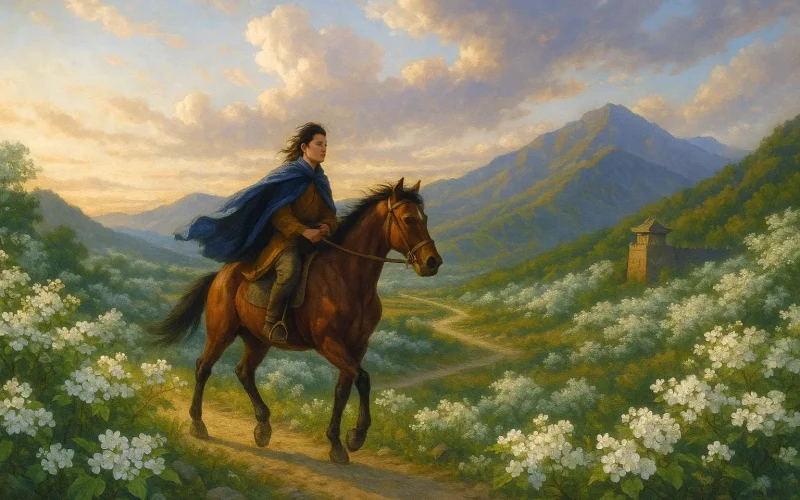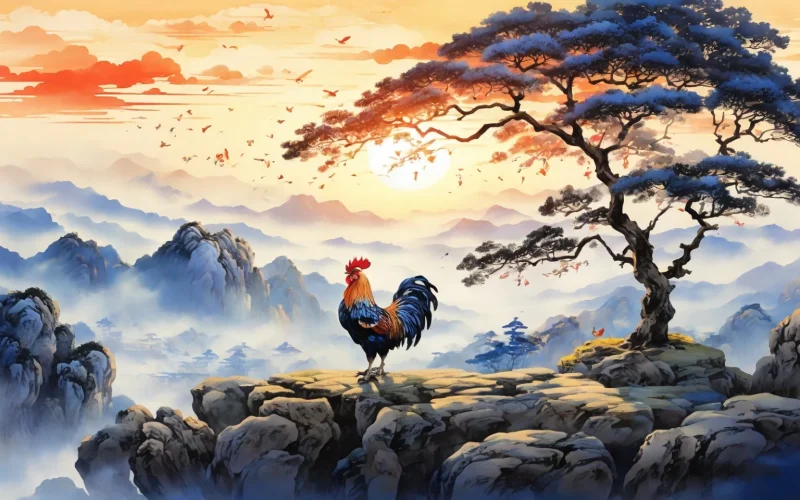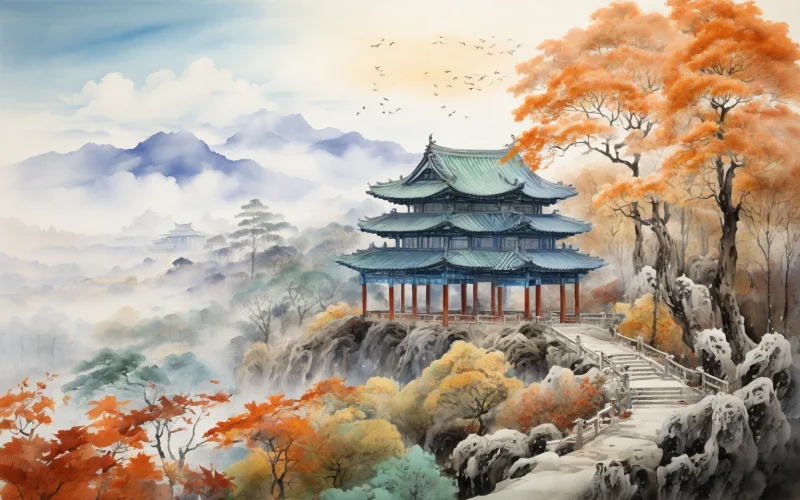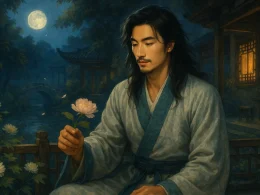You wrote a verse with lightning speed at ten years old;
We would not part though candle embers turned cold.
The flowery mountain road extends for miles and miles;
The young bird’s song surpasses the old phoenix’s trials.
Original Poem
「韩冬郎二首 · 其一」
李商隐
十岁裁诗走马成,冷灰残烛动离情。
桐花万里丹山路,雏凤清于老凤声。
Interpretation
This poem is the first in a pair composed by Li Shangyin in response to the youthful Han Wo (styled "Winter Lad"). It was written when the poet, having returned to the capital from Dongchuan, revisited the parting poems Han Wo had presented years earlier. The work is not merely an admiration of a ten-year-old prodigy's poetic talent; it seizes this occasion to forge a classic symbol of literary transmission, intergenerational surpassing, and cultural vitality. Casting himself as the "old phoenix," Li Shangyin, amidst the parting sentiments evoked by "cold ashes and guttering candles," distinctly hears the "clearer voice of the young phoenix." Using this sound as a landmark, he outlines a dynamic spiritual lineage traversing time and space.
First Couplet: 十岁裁诗走马成,冷灰残烛动离情。
Shí suì cái shī zǒu mǎ chéng, lěng huī cán zhú dòng lí qíng.
At ten, you fashioned verses swift as a galloping steed;
Cold ash, a dying candle, stirred our parting grief.
Explication: The opening establishes the poem's tension through the juxtaposition of starkly contrasting images. "At ten" and "swift as a galloping steed" highlight the precocity and agility of Han Wo's talent—a burst of youthful, vital energy. "Cold ash, a dying candle," meanwhile, evokes the stillness and melancholy of that long-ago farewell scene—a token of time's passage and the sedimentation of emotion. The phrase "stirred our parting grief" skillfully connects: it refers both to how Han Wo's poems moved the hearts of those at the parting banquet then, and how those residual feelings are stirred anew upon rereading now. Between these two lines lies a span of years, yet the existence of the poetic scroll instantly bridges the temporal gap.
Final Couplet: 桐花万里丹山路,雏凤清于老凤声。
Tóng huā wàn lǐ dān shān lù, chú fèng qīng yú lǎo fèng shēng.
On the endless road through Phoenix Mountain, where paulownias bloom,
The young phoenix's cry is clearer than the old.
Explication: This couplet contains one of Li Shangyin's most celebrated metaphors, elevating personal praise into a universal philosophy of life. "On the endless road through Phoenix Mountain, where paulownias bloom" constructs a sublime, resplendent, and mythic cultural landscape—the Vermilion Hills (Phoenix Mountain) as the dwelling place of phoenixes, the paulownia flowers as their perching and feeding ground, together symbolizing the fertile soil of a noble literary tradition. "The young phoenix's cry is clearer than the old" is the soul of the entire poem. It signifies not merely the commonplace "pupil surpassing the master" but emphasizes the "clearer" quality—the innate advantage of the later generation in the purity, clarity, and freshness of tone. This is not a negation of the "old phoenix" but a profound insight and joyful celebration of the rule of cultural heritage: renewal through transmission, sublimation through continuity.
Holistic Appreciation
This is a finely structured, deeply meaningful "allegory of literary generations." Using "poetry" as the thread, it connects three temporal dimensions: the first line addresses the past act of "creation" (fashioning verses at ten); the second line evokes the past "scene" and the present "feeling" (cold ash, a dying candle stirring grief); the final two lines articulate an eternal "principle" (the young phoenix's clearer cry). The quatrain moves from the concrete to the abstract, from event to principle, accomplishing a leap from a specific personal occasion to a universal cultural law.
Li Shangyin's brilliance lies in placing a specific instance of literary exchange and poetic evaluation within the mythic symbolic system of the "phoenix's cry on Vermilion Hills," thereby granting it timeless, classic significance. The "young phoenix" Han Wo and the "old phoenix"—the poet himself (representing the prior generation)—together constitute a bidirectional, ever-renewing relationship within the literary tradition: the "old phoenix" paved the "endless road" and nurtured the environment where "paulownias bloom"; the "young phoenix" infuses this road with fresh vitality and direction through its "clearer" cry. This is simultaneously generous praise, clear-sighted self-awareness, and steadfast faith in the vitality of culture.
Artistic Merits
- Telescoping and Interpenetration of Temporal Images: "At ten" is a point in the past; "cold ash, a dying candle" is the lingering memory of a past scene in the present; "the endless road through Phoenix Mountain" is the timeless cultural space beyond specific time. Through the link of "poetry" and "feeling," the poet skillfully telescopes these temporal layers, creating a profound sense of historical depth.
- Cultural Coding of a Metaphorical System: The cluster of images—"phoenix, Vermilion Hills, paulownia flowers"—is highly cultured and symbolic, originating from texts such as the Classic of Mountains and Seas, representing auspiciousness, nobility, and talent. Li Shangyin revitalizes this system, ensuring his praise for Han Wo transcends the commonplace, endowed with rich cultural resonance and a sacred quality.
- Complexity and Sublimation of Emotional Tone: The poem contains a faint recollection of past parting sorrow (cold ash, dying candle), genuine delight in the younger generation's talent (swift as a galloping steed), and, surpassing personal feeling, a macro-level joy and solemn recognition of cultural transmission (the young phoenix's clearer cry). Multiple emotions interweave, ultimately merging into the light of reason and philosophy.
- Craftsmanship in Syntax and Phonetics: The final two lines employ precise parallelism and flowing rhythm. "Endless" and "clearer" form a contrast of space and quality, making the lines highly memorable, vivid in imagery, and easily passed down—a formal reason for this couplet's enduring fame.
Insights
This work is like a clear song in praise of cultural transmission, surpassing simple encouragement of the young to touch upon the core mechanism of civilizational continuity and innovation. It reveals that true cultural flourishing requires not only the accumulation and pioneering of the "old phoenix" (the road, the paulownias) but also the courageous sounding of the "young phoenix's" authentic, "clearer" cry—even one that surpasses the former voice. This "clearer than" is not negation, but renewal and enrichment, the necessary and rightful growth of tradition in a new era.
In any field, especially education, scholarship, and artistic creation, this poem reminds us to cherish the "young phoenix's clearer cry"—those expressions from the younger generation that may be immature yet brim with fresh vitality and a different quality. It encourages predecessors to provide fertile ground with the broad-mindedness of the "endless road" and emboldens successors to confidently sound their own "clearer cry." In an era of rapid change, this expectation and recognition of "clearer than" is key to resisting stagnation and maintaining the vitality of collective wisdom.
The praise of "clearer than the old" that Li Shangyin sounded a millennium ago remains, to this day, the healthiest and most vibrant poetic definition of intergenerational relations: it is not simple replacement, but a clear resonance and enduring reverberation, together composing the eternal symphony of civilization's advance.
Poem translator
Xu Yuanchong (许渊冲)
About the poet
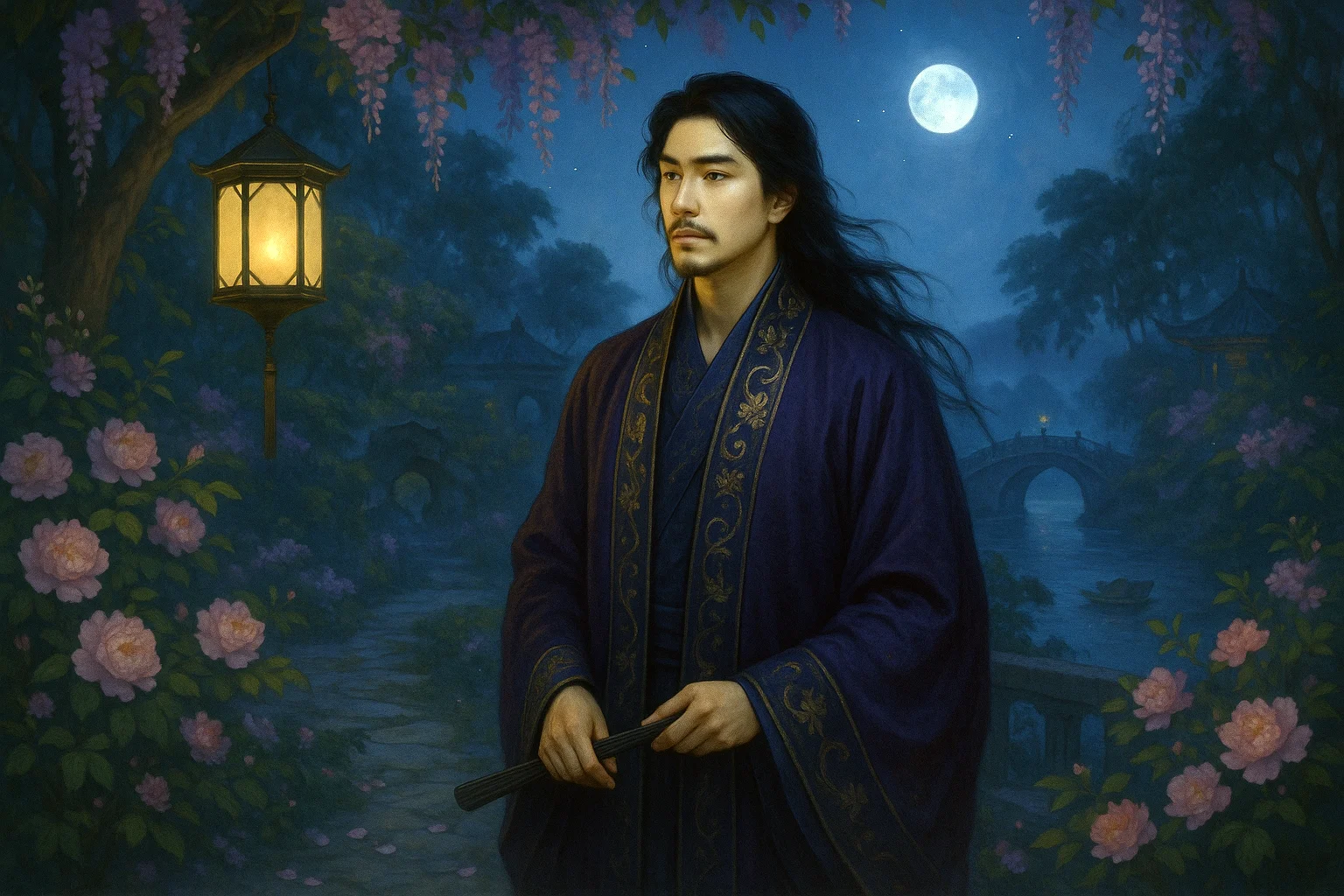
Li Shangyin (李商隐), 813 - 858 AD, was a great poet of the late Tang Dynasty. His poems were on a par with those of Du Mu, and he was known as "Little Li Du". Li Shangyin was a native of Qinyang, Jiaozuo City, Henan Province. When he was a teenager, he lost his father at the age of nine, and was called "Zheshui East and West, half a century of wandering".






